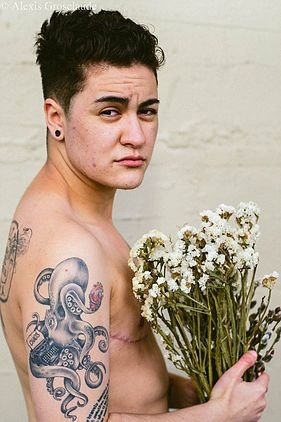"The Invisible Manhood"
A topic that often raises a lot of discussion is transgender. It's important that as a society we are accepting of the individuals going through this. The feeling of being trapped in the wrong body and not understanding your own feelings would feel like being in a mental prison. It undeniably proves how strong and courageous Alex is with his journey.

Alex S.
At the age of thirteen, Alexandra was diagnosed with severe depression. She immediately started therapy and medication. Through the support of her friends and family, she learned to live with it. In fact, she became so good at living with it that often at times people had no idea that she fought with this disease. It was like she was a normal teenage girl. But this article isn't about her. This article is about me. My name is Alexander and I am a man.
From an outsider’s perspective, I had a pretty typical high school experience. I went to school, I went to church, I had friends, I went to school dances and football games, I dated boys. But internally, it wasn't so simple. I didn't feel comfortable at church. Although I was surrounded by people, I didn't actually let anyone in. I wasn't even attracted to the boys I was dating. It was all a mask that I put on because it was what was expected of me because I was female bodied. During the day I'd wear tight low cut shirts, proudly showing off my ample cleavage, but at night I'd stand in front of the mirror, crying because they didn't feel right. I wondered what it might be like to walk down the hallway of my school, holding a girl’s hand. Not caring about labels like “gay” or “lesbian”. Neither of them felt right to me. I didn't even feel right to me. I tried to act happy and confident. But I was slowly unravelling.

I was most uncomfortable at church. I wasn't like the girls my age. They seemed to cluster together, talking about boys and trendy sitcoms, expensive makeup and shopping. And I found myself an outsider. Still I had to act happy. I had to try and blend in, try to include myself in their ramblings. Then there was the dresses. I had to wear a dress to church. The material of the dresses were made of cotton and it felt like barbed wire against my skin. Because deep inside, I was never a girl wearing a dress, I was a boy trapped in what society was telling me I had to be, just wanting to go home. Just wanting to be where I belong.
I was eighteen years old, the first time I ever saw a transgender man. He was on a YouTube video, talking about taking testosterone. He wasn't much older than me. He spoke about how he had never felt quite right in his body, about feeling his best when he dressed and acted more masculine, and his journey into manhood and becoming his true self. I watched a video that showed his progression throughout his transition.
With every clip, his face grew more masculine. His voice became deeper and he began to grow his body and facial hair. As he progressed, he seemed happier. I watched his videos frequently. Often repetitively. For the first time, I felt that I could truly relate. I now understood why I never felt comfortable in my body and why I always felt like I had to pretend.
Coming out to my parents as transgender wasn't easy. It was so difficult, in fact, I ended up waiting five years to tell them even after I knew, but I had to tell them. I had made the decision to start my transition from male to female and with hormones, and that meant I wouldn't be able to hide the changes from them for long. Because of religion, many of their friends would be judgemental of their decision to support me. Though they did not necessarily agree with or understand my decision to live openly as a man, they wanted me to be happy. I know that my transition has been very hard on them, and although their words have not always been kind on the matter, they try to be as supportive as possible.
Coming out at work was much easier. To be honest, no one at my work was surprised. At this point, I had cut my hair short and was already only wearing clothes from the men’s section. If it hadn't been for the incredible team that I worked with, I might not have had the courage to make the appointments and start hormone replacement therapy. Their constant words of encouragement was the fuel that pushed me to live authentically. Immediately after coming out, they began using he/him pronouns for me instead of she/her. Every time I was called “sir” instead of “ma'am” my whole day was instantly brightened.

I began seeing a counsellor. After a few appointments, she diagnosed me with gender dysphoria. With this diagnosis, I would be allowed to start hormone replacement therapy. I was well on my way to becoming the man that I was always meant to be.
On May 31 2016, I gave myself my first shot of testosterone. From then on, I injected myself with it every two weeks. With every shot, I felt stronger. Every month, my voice seemed deeper. I'd watch as my jawline became sharper and hair would start to grow on my upper lip and chin. Soon, it wasn't just co-workers using he/him pronouns. It was strangers as well. People began to see me as the man I was. The more masculine I presented, the more confident I felt. He/him pronouns became the norm for me. I was able to take myself off depression medication. I was happy, I was complete. I finally felt that I belonged.
I want to reiterate the importance of living life authentically. Be true to yourself. Although others may not understand or even agree with your journey, it is unique to you. You cannot live your life and expect to be happy if your focus is based on the acceptance of others. Be you, that’s all that matters.
Team at Voice of Health
If you have a story you would like to share, please feel free to contact us at
info@voiceofhealth.com.au
Website: www.voiceofhealth.com.au - Facebook: @voiceofhealthau - Instagram: @vohofficial

It's great that you are now feeling like yourself, dude!
It's great to read a story that includes supportive coworkers and family. Too many religions tend to be an enemy of human rights and create a lot of stigma around this issues which leads to a lot of metal suffering and unhappiness. That's why it's great of you to share your story so openly for everyone to see. For the people who want/need it, a transition might be life-changing in a very positive way, so they need to realize the option exists.
Thanks rocking-dave for your support! Alex is an amazing individual with a powerful story.
Such a good point you raise about the creation of a stigma around these issues, which is why its so great for Alex to have the courage to tell his story. Thanks so much for your comment and support.
So wonderful to hear your journey. You are indeed brave and amazing!! Thank you so much for sharing!
Thanks Steampunk-penny! It really is a great story and we are so privileged to have Alex share it.
Why should I be accepting of people that can't accept themselves?
It's dangerous and harmful to dismiss a mental disorder by saying that there's no problem, or that it's "brave" and "just" to pursue such fantasies. Don Quixote charged at windmills. This was unhealthy and destructive.
The rate of suicide and reported attempted suicide does not change after transition. This shows that transitioning is not a solution. This should be obvious since a mental disorder cannot be resolved through physical means. Anorexia, for instance, can't be solved through force feeding. Anorexia can only be solved by the affected through mental change. Gender identity disorder is the same. Men will never understand what it's like to be a woman and women will never understand what it's like to be a man.
A big part of the feminist movement was to let go of gender norms, such as playing with trucks, wearing dresses, enjoying particular shows, etc. When I was young, I was interested in the feminine things because I had an older sister. In modern day, I would have been diagnosed with gender identity disorder and be given irreversible surgery and hormone replacement therapy that would lead me to an early, cancerous, grave. Why is it that not doing the things that people usually do means you have a mental disorder? I certainly didn't.
This insane concept that gender identity disorder is somehow a legitimate medical condition is bizarre and extremely harmful. 10-15 years from now we will see higher suicide rates among "transgenders" because there are many children who have gone through this process without understanding what it really means. Kids who don't have gender identity disorder are being treated as such. It's child abuse.
Bein transgender is not about not accepting yourself, it's the opposite of that. It's about accepting yourself and understanding yourself.
Suicide rates do not change dramatically after transition largely because of the attitudes above. The stigma attached to being transgender does not disappear after transition, being insulted assaulted and marginalised is still something a lot of transgender people have to deal with.
If you played with trucks when you were young no doctor would have considered gender reassignment. That's really not even close to how it works. There are two steps to pre-operative transition and the competency and consent required for each stage is judged by psychiatrists. No child is simply given irreversible surgery because of the toys they enjoy playing with.
We now understand enough about our sexual biology to have a fairly good hypothesis on how a lot of transgender minds and bodies occur. Your bizarre take on this topic is what is insane. Medical professionals do not take any condition lightly, we do not make decisions based on whims and we don't play politics with patients lives. When we treat patients we treat them based on an in-depth understanding of potential biopsychosocial aspects of health. Ten to fifteen years from now hopefully we'll live in a more understanding society where people are free to pursue whichever sex or sexual identity they like, without random people judging them for their deicsisions based on inept understandings of human psyche and biology.
It is a complete lie that attitude towards transgenders have any impact on the suicide rate. The rates of suicide are so high that they’re comparable only to war vets and Jews in Nazi Germany. Unless transgenders are treated as badly as Jews in Nazi Germany, there is clearly something wrong with being transgender.
Medical professionals who recommend gender “reassignment” surgery to children under 18 are bad people taking part in child abuse.
Gender identity disorder is a mental disorder and the way to treat it is through non physical means. You don’t encourage anorexic to keep refusing to eat or tell them that they’ll be beautiful if they keep doing what they’re doing. This is exactly what you’re doing to transgenders. The first step in helping them is acknowledging the problem.
If you’ve bought into the propaganda, I truly feel sorry for you. Gender identity disorder is becoming an epidemic because professionals are unwilling to ask hard questions, and are treating the issue like its normal.
Professionals are the ones who understand the problem. Not keyboard warriors, I'm sorry you feel you're so informed on something you're so clueless about.
You don't need to be a professional to understand basic mental disorder or basic biology. You have to be particularly educated to be this stupid. It's ideological.
Unfortunately not. Thankfully we're the ones with the power and you're the ones with the keyboards. Best of luck with making changes that way :)
If you're injecting ideology into your field, you are not fit to serve in that field. If you're a professional or an aspiring professional you should value truth over ideology.
But we have these studies that show it is.
https://www.vox.com/cards/transgender-myths-fiction-facts/transgender-people-mentally-ill-myth
http://time.com/4424589/being-transgender-is-not-a-mental-disorder-study/
https://www.beyondblue.org.au/docs/default-source/research-project-files/bw0288_the-first-australian-national-trans-mental-health-study---summary-of-results.pdf?sfvrsn=2
Vox is not a reliable source. There are also studies showing that vaccines cause autism, but we both know that that's untrue. In the Time piece it mentions how gender identity disorder is not a disorder, similarly to homosexuality. But homosexuality remains a mental disorder because science doesn't care about your feelings. Homosexuality was removed from the DSM for political reasons, not scientific ones.
If gender identity disorder is not a mental disorder, why does the suicide rate remain unchanged post-transition? Surely there would be some tangible result if the proposed solution was doing anything to remedy the issue.
How can a boy "feel" like he's a girl? He's never been a girl. He never can be a girl. Biology dictates that you remain the gender of your birth.
Taking a pro-transgender position is taking an anti-science and anti-truth position.
Actually, this is incredibly incorrect. From birth and during life there are many disorders that can change someone's position on the traditional gender spectrum. Lactotrophic adenomas, Kleinfelters, Turners, Congenital Adrenal Hypoplasia etc...
Not to mention that as women age they lose secondary female sexual characteristics and gain male ones due to a slow down of liver function.
Sex is not black and white, even in nature, so why pretend it's black and white in our brains.
There is no gender spectrum. There is biologically only male and female.
Yes, it is. You're using the words "sex" and "gender" interchangeably, meaning you don't care about consistency in your ideology. Sex is "supposed" to be the black and white one.